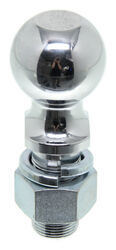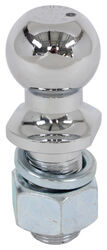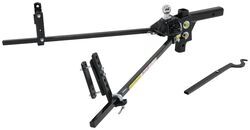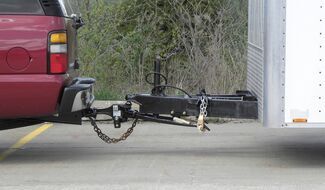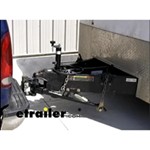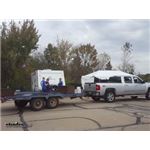
Comparing Reese Steadi-Flex and Equal-I-zer Weight Distribution Systems
Question:
Will be towing a relatively light camping trailer with my 2016 Toyota 4Runner. TW is listed at 180lb. and GTW at 3200. Im in Colorado, so anticipate winding roads and wind. Your site leads me to the Reese #66557 and Equal-I-zer EQ37040ET. Any opinion as to which is superior? Easier to hitch/unhitch? Install?
asked by: Eric Y
Expert Reply:
The 180 pounds is the dry tongue weight. Tongue weight is usually 10 to 15 percent of the gross trailer weight. So if 180 is the minimum and the gross trailer weight rating is 3,200 pounds that would mean that on the high end the tongue weight could be as much as 480 pounds.
Also for weight distribution you would add in the weight of anything carried behind the rear axle of the tow vehicle. So for example if the trailer tongue weight is 300 pounds and you have 100 pounds of stuff loaded behind the rear axle of your 2016 4Runner the total tongue weight is 400 pounds.
Just keep that in mind when choosing a system. You will want one that has a tongue weight capacity range that puts your total tongue weight in the middle of the systems range.
Between the Reese Stead-Flex # 66557 or Equal-I-zer # EQ37040ET I give the edge to the Steadi-Flex. It uses brake pad-like material for sway control rather than metal on metal contact that the Equal-I-zer systems use so it tends to be a bit less noisy. But both systems are highly rated and work well so I am sure you'd be happy with either one.
The Equal-I-zer system comes with a 2 inch ball so if you need a 2-5/16 inch it would have to be purchased separately, # 19286. The Steadi-Flex system does not come with a ball so for a 2 inch ball use # A-90 or for a 2-5/16 inch use # 19286.
I have included a couple of links to our guides on weight distribution and determining tongue weight for you.

Products Referenced in This Question
2-5/16" Hitch Ball - 1-1/4" Diameter x 2-3/4" Long Shank - Chrome - 12,000 lbs
- Trailer Hitch Ball
- Trailer Hitch Ball
- Standard Ball
- Chrome-Plated Steel
- 2-5/16 Inch Diameter Ball
- 2-3/4 Inch Shank Length
- 1-1/4 Inch Diameter Shank
- 12000 lbs GTW
- Class IV
- Class V
- Draw-Tite
more information >
2" Hitch Ball - 1-1/4" Diameter x 2-5/8" Long Shank - Chrome - 10,000
- Trailer Hitch Ball
- Trailer Hitch Ball
- Standard Ball
- Chrome-Plated Steel
- 2 Inch Diameter Ball
- 2-5/8 Inch Shank Length
- 1-1/4 Inch Diameter Shank
- 10000 lbs GTW
- Class IV
- Class V
- CURT
more information >
Equal-i-zer Weight Distribution System w/ 4-Point Sway Control - 4,000 lbs GTW, 400 lbs TW
- Weight Distribution Hitch
- WD With Sway Control
- Some Sway
- Includes Shank
- Electric Brake Compatible
- Surge Brake Compatible
- Fits 2 Inch Hitch
- Allows Backing Up
- 200 lbs
- 300 lbs
- Equal-i-zer
more information >



